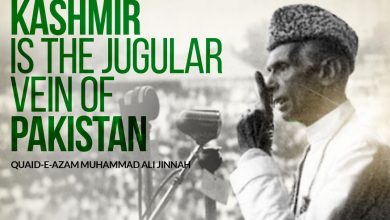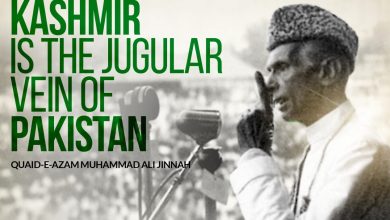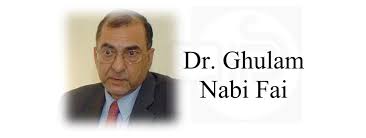Article: Jammu and Kashmir Elections 2024: A Turning Point for the Region?
Intern Maida Zafar.
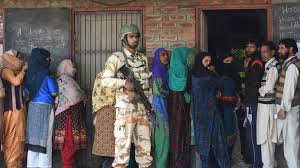
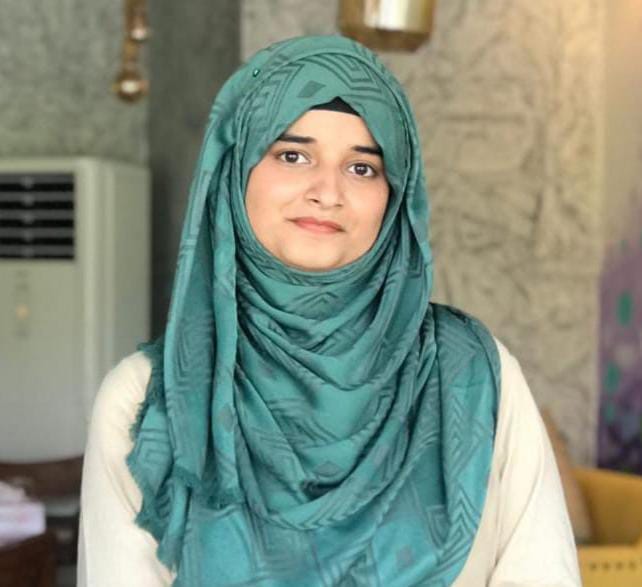
2024 Jammu and Kashmir elections a step towards progress or more oppression of the region? This question raised a lot of concerns about Kashmir’s stability. Indian Illegally Occupied Jammu and Kashmir is a region which has been facing political, social and regional instability since many decades. Even after the announcement of Lok Sabha Elections, there are still obstacles that need to be tackled. The 2024 legislative assembly elections in Jammu and Kashmir mark the first (what) since the region’s special status was revoked in 2019. The Jammu and Kashmir National Conference (JKNC), Bharatiya Janata Party (BJP), People’s Democratic Party (PDP), and Indian National Congress (INC) are among the major political parties contesting the elections. The electoral campaigns by each party showed their agenda and stance regarding these elections. However, numerous accusations of electoral manipulation have been made about BJP because of their controversial electoral campaigns. The elections are marked as a significant factor in shaping the lives of innocent kashmiris. Kashmiris have been suppressed for many years and have faced human rights violations . The elections are viewed by kashmiris with a combination of both hope and cynicism about the possibility of a meaningful change. Similarly, India views the polls as a step towards normalcy. On the other hand, Pakistan’s response remains skeptical, viewing these elections from every clarify perspective.
These elections hold a significant position in shaping Kashmir’s socio- political and economic dynamics.
The elections which were held between April 19th, 2024 till May 25th, 2024 marked an essential event in the political history of IIOJK. The elections in Jammu and Kashmir were being held in five different phases.1
Constituency 2024 Winners 2024 Runner-ups
Udhampur BJP’s Dr Jitendra Singh. INC’s Ch Lal Singh.
Anantnag-Rajouri Jammu & Kashmir
National Conference’s Mian Altaf Ahmad. Jammu & Kashmir Peoples Democratic
Party’s Mehbooba Mufti.
Baramulla Independent – Abdul
Rashid Sheikh. Jammu & Kashmir
National Conference’s Omar Abdullah.
Jammu BJP’s Jugal Kishore. INC’s Raman Bhalla.
Srinagar Jammu & Kashmir
National Conference’s Aga Syed Ruhullah
Mehdi. Jammu & Kashmir Peoples Democratic Party’s Waheed Ur
Rehman Para.2
https://m.greaterkashmir.com/article/campaigning-for-the-final-phase-of-lok-sabha-general-elections2024-concludes/303287
https://www.cnbctv18.com/india/politics/jammu-and-kashmir-2024-lok-sabha-election-results-live-full-listof-winners-by-constituency-19423503.htm
While majority of the parties focused on highlighting local issues such as unemployment, infrastructure, some other parties highlighted the human rights violations faced by Kashmiris. Not a single party showed interest in showing solidarity with the right of self determination of Kashmiris. The electoral campaigns included digital campaigns, rallies and small gatherings. Several incidents during elections were documented such as arrests of political activists, violent clashes between political supporters etc. Moreover, there were several allegations regarding these elections including electoral malpractice, vote rigging. However, all these allegations were dismissed by the Election Commission of India.
Media, being a powerful tool for promoting transparency and insightful information could play a pivotal role in these elections. But the media reporting in the case of elections in IIOJK seemed to be biased. The selective reporting and negative narrative building couldn’t showcase the ground realities of lives of kashmiris. Some of the media platforms in Pakistan remained silent about the hypocrisy of the Indian Government during the elections. Contrary to that, Indian Media reporting was biased showing only one side of the story and hiding the reality of the problems faced by Kashmiris.
In addition to that, Article 35A and implementation of such other laws are seen as a threat to the rights of kashmiri people. Kashmiris have now taken the chance to vote for those who they considered to be “lesser evil”, rather than getting oppressed by the greater evil .i.e the BJP. The Article 35A is the new tactic of the Indian Government to suppress the rights of Muslim majority living in kashmir. It is a violation of land ownership rights,voting rights and other human rights. It has further led to an increase in issues such as unemployment, poverty, inequality etc. India seemed to be using elections as a tool by concealing the reality to create a more unjust and politically unstable kashmir. Kashmiris have mixed response to these ongoing elections. Many kashmiris shifted from boycotting to voting their local leaders who can speak for them. While,other kashmiris still opt to not vote either of the parties to condemn the domicile act 35A.
“The purpose I voted today was to choose my local Kashmiri representative who can speak on behalf of us to India. I want my friends to be released from jails,” said Khan(Kashmiri Citizen).[ https://www.aljazeera.com/news/2024/5/16/kashmir-breaks-with-election-boycotts-protests-indianpolicies-by-voting ]
The Article 35A has snatched away the rights of kashmiris and is seen as an Indian agenda to gain and maintain more power in the region. The elections which have seen the highest voter turnout compared to previous elections include a majority of Indian citizens who got the right to vote under Article 35A despite not even living in IIOJK. The BJP has liberalized the state, permitting foreigners to buy real estate and register to vote in Kashmir for the first time. A great number of people are concerned that the government is trying to change the state’s current Muslim’s majority demographics, as more than two million additional citizens have registered to vote. Although India has always viewed elections in Occupied Jammu and Kashmir, either State Assembly or Lok Sabha, from a strategic and security point of view, with a couple of objectives; firstly to legitimize its rule in the territory and secondly and most importantly to portray participation of people of Kashmir in Delhi-backed polls as a proxy for their faith in Indian government and show the world that all is well.Even after the elections, the major issues including the issue of
identity, human rights and autonomy faced by kashmiri people remain.[ https://pakobserver.net/elections-2024-whats-in-it-for-kashmiris/ ] Pakistan has also criticized and accused India of conducting unjust elections and suppressing the voices,rights and aspirations of Kashmiri people. Pakistan has dismissed the elections as Kashmir is a disputed territory, so this should not be considered fair and free elections. Despite majority Kashmir and Pakistan’s common stance ,India viewed the elections as a sign of a successful democratic system.
“Would especially like to applaud the people of Srinagar Parliamentary constituency for the encouraging turnout, significantly better than before,” Modi tweeted. [ https://www.aljazeera.com/news/2024/5/16/kashmir-breaks-with-election-boycotts-protests-indianpolicies-by-voting ]
The 2024 elections were the landmark event in the history of Indian Occupied Jammu and kashmir. Despite India’s depiction of elections as a step towards progress and normalcy, the elections can led to more instablity in the occupied region. The 2024 elections of IIOJK is the tactic to hide the reality of Indian Government by shifting the focus towards normalisation of democracy in the region. Presence of Indian military in the region has caused the distrust among people regarding credibility of the elections. The solution to the problem isn’t conducting unjust elections but to address the human rights violations faced by kashmiri people at global level. The ultimate solution to the Kashmir issue lies in granting the right to self-determination to the people of Indian occupied Kashmir, rather than perpetuating ineffective electoral processes.[ https://www.pakistantoday.com.pk/2024/05/16/failed-indian-attempts-for-peaceful-elections-in-indianoccupied-kashmir/ ] Only those elections could be considered a turning point for the region where everyone gets the chance to vote for
those who stands for their rights and raise their voices at a bigger level which the 2024 elections failed to do so.
Notes and References
Pandey, Devesh K. “Campaigning for the Third Phase of the Lok Sabha Election Concludes.” The Hindu, May 7, 2024. https://www.thehindu.com/elections/loksabha/campaigning-for-the-third-phase-of-the-lok-sabha-electionconcludes/article68142452.ece.
12, Jomy Jos Pullokaran August. “Jammu and Kashmir 2024 Lok Sabha Election Results: Full List of Winners by Constituency – CNBC TV18.” CNBCTV18, August 12, 2024. https://www.cnbctv18.com/india/politics/jammu-and-kashmir-2024-loksabha-election-results-live-full-list-of-winners-by-constituency-19423503.htm.
Junaid Kathju. “Why Are Kashmiris Voting in Indian Election They’ve Long
Boycotted?” Aljazeera, May 16, 2024.
https://www.aljazeera.com/news/2024/5/16/kashmir-breaks-with-election-boycottsprotests-indian-policies-by-voting.
desk, News. “Elections 2024: What’s in It for Kashmiris?” Pakistan Observer, May 9, 2024. https://pakobserver.net/elections-2024-whats-in-it-for-kashmiris/.
Alvi, Abdul Basit. “Failed Indian Attempts for Peaceful Elections in Indian-
Occupied Kashmir.” Pakistan today, May 16, 2024.
https://www.pakistantoday.com.pk/2024/05/16/failed-indian-attempts-for-peacefulelections-in-indian-occupied-kashmir.
Bhan, Mona, Haley Duschinski, and Deepti Misri. Routledge Handbook of Critical Kashmir Studies, June 13, 2022. https://doi.org/10.4324/9780429330810.





